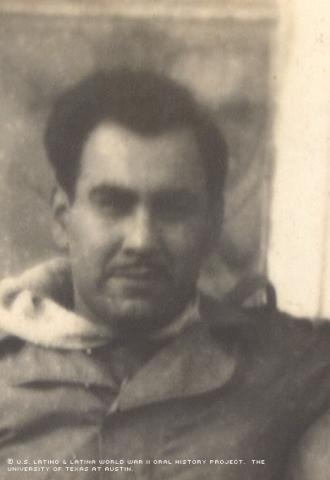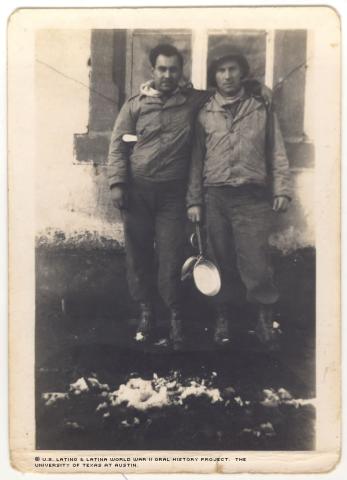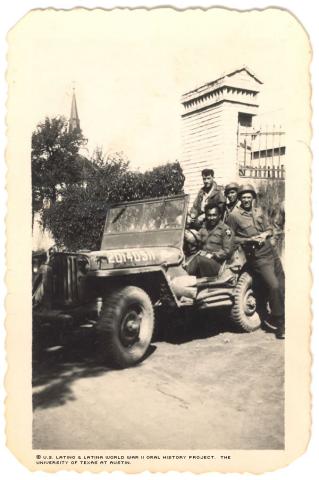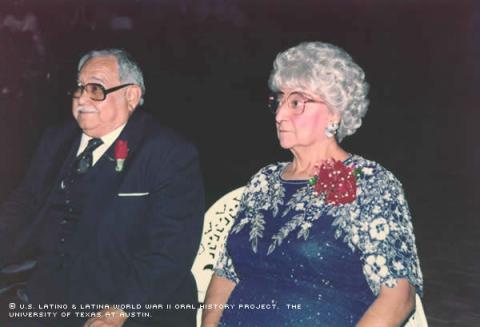



By Layron Livingston
Before entering World War II, Richard M. Bustos, Sr. endured a different kind of battle. As an adolescent in rural southeastern Texas, he encountered racial segregation and discrimination daily.
“On signs, you’d see ‘No Mexicans’ and ‘No Blacks.’ … You couldn’t drink water from the fountains. … At restaurants, you had to go to the kitchen to get something to eat,” Bustos said.
“You’d go to the picture show and you’d have to sit in the balcony. They’d say, ‘You can’t sit here, you sit there.’ … My dad used to tell me, ‘Always have respect for them – even if they push you out into the sidewalk.’... That’s how it was then.”
Bustos was born July 15, 1922, in Gulf, also know as Old Gulf, Texas. His father, Donacíon Bustos, immigrated to the United States from Mexico as a teenager and worked in Gulf at the Texas Gulf Sulphur Company.
“When he was a kid, [my dad] worked on the railroads; all I can remember is him working,” Bustos said.
His mother, Estefana Martinez, was born in Refugio, Texas. His parents met in Bay City, Texas, and had two daughters: Irene Suarez and Ofelia Guzman.
Bustos attended school through the fourth grade in Gulf. His family moved to Bay City, about 70 miles southwest of Houston, where he still lives today, when he was 14 or 15, he says.
He cleaned and repaired Singer Sewing Machines from 1937 to 1940, when he decided to enlist in the Army.
“I didn’t get drafted, I volunteered,” Bustos said. “The war broke out and I figured, ‘I’m young.’ And I didn’t want to stay in [Bay City], so I went into the Army.”
He was 18 years old.
Bustos went to Houston to enlist and was later sent to Fort Sam Houston in San Antonio to train. He was assigned to the 38th Field Artillery Battalion, 2nd Infantry Division.
Bustos says he was trained as a machine gunner, but during the war, he served as a truck driver and courier, getting ammunition for his division and delivering it to the western front.
From Fort Sam Houston he went to McCoy, Wis., and Fort Smith, Mich., for snow training, which he says was very helpful.
“It was cold over there. I’m from Texas; I didn’t like that weather,” he said.
After a year, Bustos and his unit were shipped to Northern Ireland in Oct. of 1943, as part of Operation Overlord, the build up for the Normandy invasion.
“I told my folks not to worry about me – just to pray for me,” he said, adding that he didn’t even write his family because he didn’t want them to worry.
The 2nd Infantry landed on the beaches of Normandy on June 7, 1944.
“All [you] could hear were guns,” Bustos said. “You could see a lot of soldiers on that beach. It was really bad.”
“I was praying everyday; I saw a few of my buddies take direct hits. Things like that – when you see it, you feel bad,” he said.
The 2nd Infantry Division successfully took the port city of Brest, France, used during the war as a German submarine base. The division was also able to seize important roadways leading into the cities of Liege and Antwerp in Belgium.
On May 8, 1945, when the Allies formally celebrated the defeat of German Nazi forces, Private First Class Bustos was in Leipzig, Germany. He left Europe later that summer.
“When we landed in Miami, it was about 1 o’clock in the morning. We got off the plane and I kissed the ground,” he said.
The next day, Bustos boarded a train and made his way back to Texas. After three years of armed combat, he returned home to face another war.
In Wharton, a small town northeast of Bay City, he recalls asking a taxi driver if he could take him to Bay City.
“I wasn’t in uniform; I was in a shirt and some khakis,” Bustos said.
“The driver said, ‘No, I can’t take you to Bay City.’”
“I said, ‘I have money and will pay you.’ But he said, ‘No, I can’t take you to Bay City.’”
Interpreting that as meaning he couldn’t take any “Mexicans” to Bay City, Bustos began trekking the 20- or 30-mile trip. He was later able to catch a ride on the back of a milk truck that took him into town.
When he arrived at his parents’ home, he knocked on the door. And when his mother and father answered, he asked if Ricardo Bustos lived there, and embraced them on the porch.
“They were happy to see me,” Bustos said.
He remained in Bay City, where he married Cruz Morales in June of 1946, his wife of more than 56 years. Together they have four children: Richard M. Bustos, Jr., Lydia Woods, Rebecca Rodriguez and Natividad Bustos. He also has six grandchildren and several great-grandchildren.
At the time of Bustos’ interview, the 83-year-old lived in his home in Bay City and was the only surviving member of the 38th Field Artillery Battalion of the 2nd Infantry Division.
Mr. Bustos was interviewed in Bay City, Texas, on February 14, 2006, by Paul R. Zepeda.

